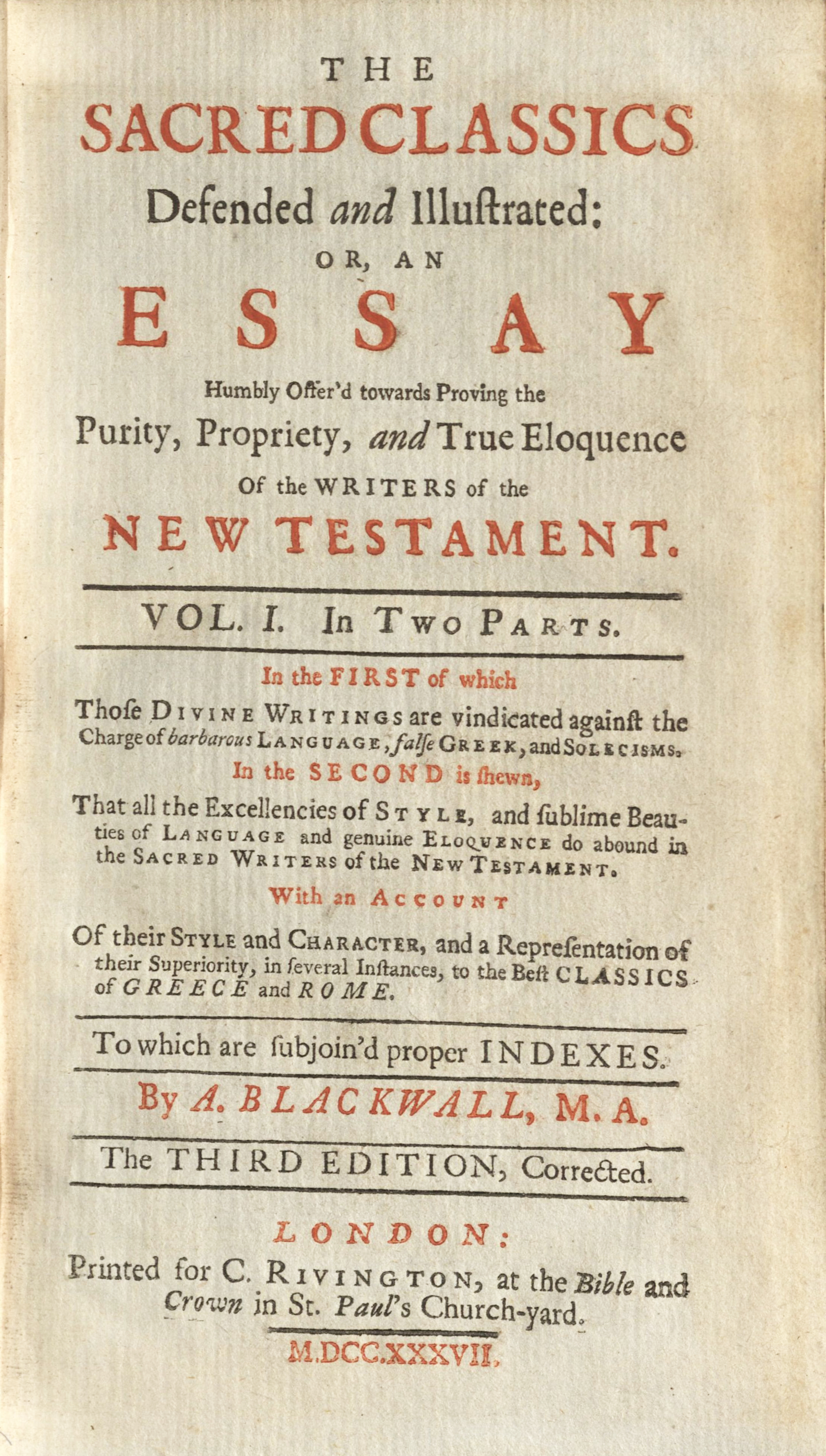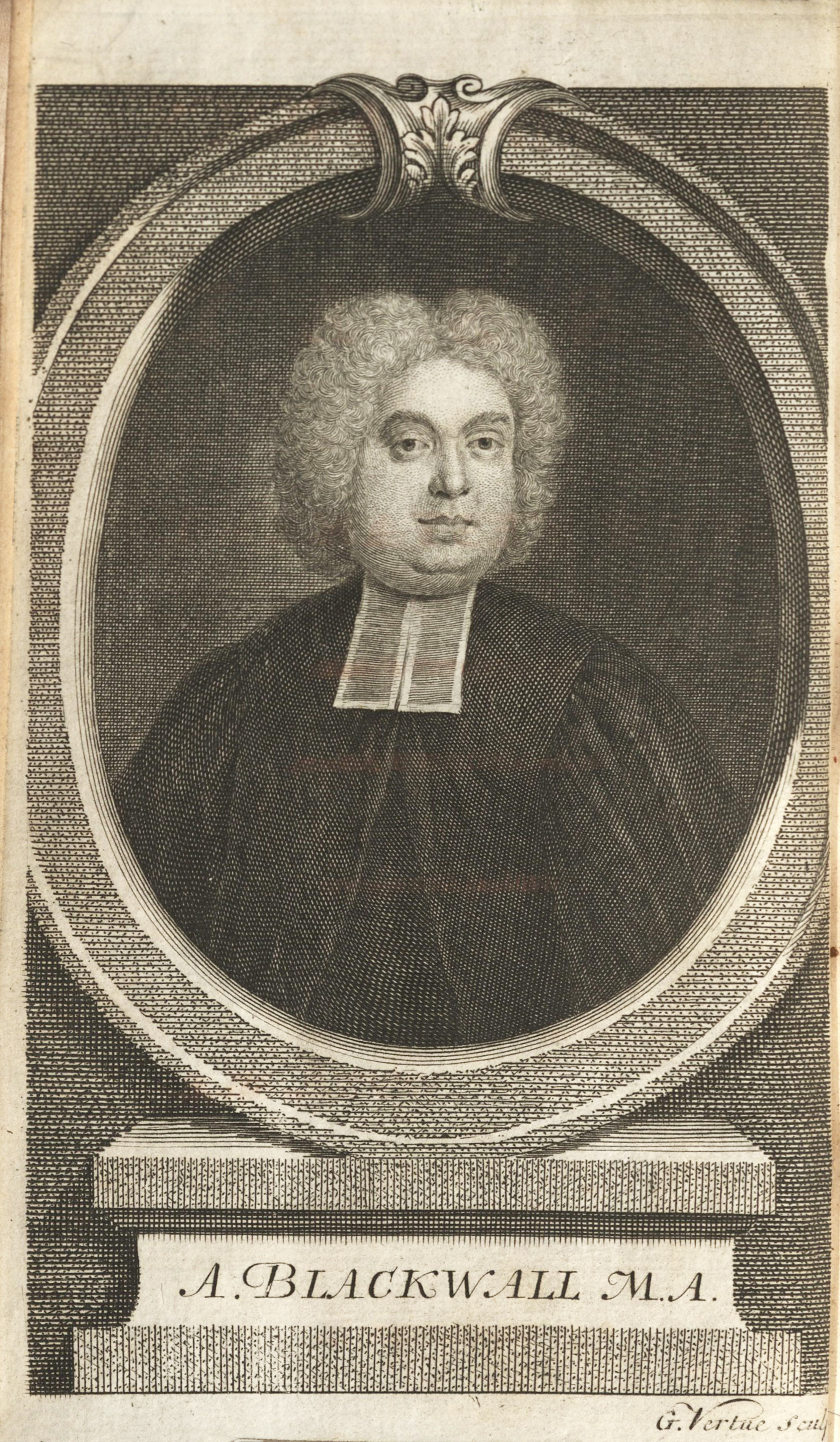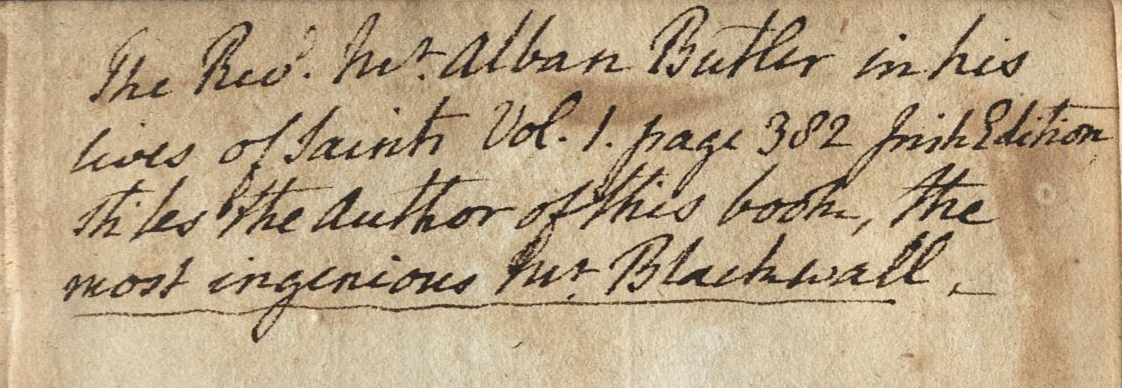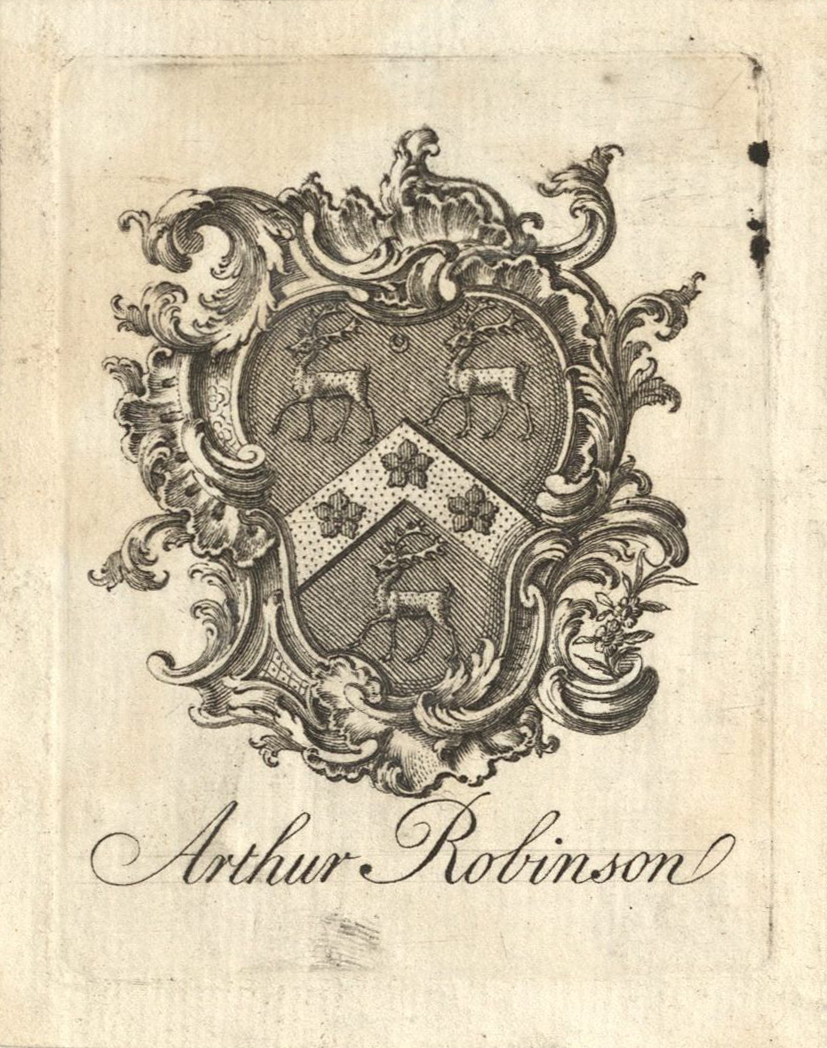Difference between revisions of "Sacred Classics Defended and Illustrated"
m |
m (→by Anthony Blackwall) |
||
| Line 15: | Line 15: | ||
|desc=[[:Category: Duodecimos|Duodecimo]] (18 cm.) | |desc=[[:Category: Duodecimos|Duodecimo]] (18 cm.) | ||
|shelf=B-1 | |shelf=B-1 | ||
| − | }}[[File:BlackwellSacredClassics1737v1Frontispiece.jpg|left|thumb|250px|<center>Frontispiece, volume one.</center>]]<br />[[wikipedia: Anthony_Blackwall|Anthony Blackwall]] | + | }}[[File:BlackwellSacredClassics1737v1Frontispiece.jpg|left|thumb|250px|<center>Frontispiece, volume one.</center>]]<br />[[wikipedia: Anthony_Blackwall|Anthony Blackwall]] (bap. 1672, d. 1730) grew up in Derbyshire, England, the son of Anthony Blackwall.<ref>John Westby-Gibson, rev. by S. J. Skedd, "[https://doi.org/10.1093/ref:odnb/2537 Blackwall, Anthony (bap. 1672, d. 1730)]" in ''Oxford Dictionary of National Biography'' (Oxford University Press, 2004- ), accessed March 2, 2022.</ref> After a grammar school education in Derby, he attended Emmanuel College, Cambridge, earning a BA in 1695 and an MA in 1698. His career included positions a headmaster of Derby grammar school and headmaster of Market Bosworth grammar school. Additionally, he held the vicarage of Elvaston, Derbyshire from 1699 to 1723.<ref>Ibid.</ref> |
| + | |||
| + | Blackwall published his first work, a version of the poetry of [[wikipedia: Theognis_of_Megara|Theognis of Megara]] entitled simply ''Theognis'', in 1706 and followed this with ''An Introduction to the Classics'' in 1718. In 1728, he anonymously published ''A New Latin Grammar: Being a Short, Clear, and Easy Introduction of Young Scholars to the Knowledge of the Latin Tongue''.<ref>Ibid.</ref> | ||
The Author's own description proves incredibly accurate in this case. He writes that this work is "An essay humbly offered towards proving the purity, propriety, and true eloquence of the writers of the New Testament : in two parts : in the first of which those divine writers are vindicated against the charge of barbarous language, false Greek, and solecisms : in the second is shewn, that all the excellencies of style, and sublime beauties of language and genuine eloquence do abound in the sacred writers of the New Testament, with an account of their style and character, and a representation of their superiority, in several instances, to the best classics of Greece and Rome" | The Author's own description proves incredibly accurate in this case. He writes that this work is "An essay humbly offered towards proving the purity, propriety, and true eloquence of the writers of the New Testament : in two parts : in the first of which those divine writers are vindicated against the charge of barbarous language, false Greek, and solecisms : in the second is shewn, that all the excellencies of style, and sublime beauties of language and genuine eloquence do abound in the sacred writers of the New Testament, with an account of their style and character, and a representation of their superiority, in several instances, to the best classics of Greece and Rome" | ||
| − | This linguistic defense of the poetry of the New Testament is incredibly interesting theologically as it represents the works of the new testament as written shaped and manipulated by authors rather than being true representations of the word of God himself. <ref> The sacred classics defended and illustrated, or, An essay humbly offer'd towards proving the purity, propriety, and true eloquence of the writers of the New Testament : in two parts : in the first of which those divine writers are vindicated against the charge of barbarous language, false Greek, and solecisms : in the second is shewn, that all the excellencies of style, and sublime beauties of language and genuine eloquence do abound in the sacred writers of the New Testament, with an account of their style and character, and a representation of their superiority, in several instances, to the best classics of Greece and Rome : to which are subjoin'd proper indexes : Blackwall, Anthony, 1674-1730 : Free Download & Streaming : Internet Archive (Internet Archive)[https://archive.org/details/sacredclassics01blac] | + | This linguistic defense of the poetry of the New Testament is incredibly interesting theologically as it represents the works of the new testament as written shaped and manipulated by authors rather than being true representations of the word of God himself. <ref> The sacred classics defended and illustrated, or, An essay humbly offer'd towards proving the purity, propriety, and true eloquence of the writers of the New Testament : in two parts : in the first of which those divine writers are vindicated against the charge of barbarous language, false Greek, and solecisms : in the second is shewn, that all the excellencies of style, and sublime beauties of language and genuine eloquence do abound in the sacred writers of the New Testament, with an account of their style and character, and a representation of their superiority, in several instances, to the best classics of Greece and Rome : to which are subjoin'd proper indexes : Blackwall, Anthony, 1674-1730 : Free Download & Streaming : Internet Archive (Internet Archive)[https://archive.org/details/sacredclassics01blac] </ref> |
==Evidence for Inclusion in Wythe's Library== | ==Evidence for Inclusion in Wythe's Library== | ||
Revision as of 10:59, 11 May 2023
by Anthony Blackwall
| Sacred Classics Defended and Illustrated | |
|
Title page from Sacred Classics Defended and Illustrated, George Wythe Collection, Wolf Law Library, College of William & Mary. | |
| Author | Anthony Blackwall |
| Published | London: Printed for C. Rivington |
| Date | 1737 |
| Edition | First |
| Language | English |
| Pages | xii, 361 |
| Desc. | Duodecimo (18 cm.) |
| Location | Shelf B-1 |
Anthony Blackwall (bap. 1672, d. 1730) grew up in Derbyshire, England, the son of Anthony Blackwall.[1] After a grammar school education in Derby, he attended Emmanuel College, Cambridge, earning a BA in 1695 and an MA in 1698. His career included positions a headmaster of Derby grammar school and headmaster of Market Bosworth grammar school. Additionally, he held the vicarage of Elvaston, Derbyshire from 1699 to 1723.[2]
Blackwall published his first work, a version of the poetry of Theognis of Megara entitled simply Theognis, in 1706 and followed this with An Introduction to the Classics in 1718. In 1728, he anonymously published A New Latin Grammar: Being a Short, Clear, and Easy Introduction of Young Scholars to the Knowledge of the Latin Tongue.[3]
The Author's own description proves incredibly accurate in this case. He writes that this work is "An essay humbly offered towards proving the purity, propriety, and true eloquence of the writers of the New Testament : in two parts : in the first of which those divine writers are vindicated against the charge of barbarous language, false Greek, and solecisms : in the second is shewn, that all the excellencies of style, and sublime beauties of language and genuine eloquence do abound in the sacred writers of the New Testament, with an account of their style and character, and a representation of their superiority, in several instances, to the best classics of Greece and Rome"
This linguistic defense of the poetry of the New Testament is incredibly interesting theologically as it represents the works of the new testament as written shaped and manipulated by authors rather than being true representations of the word of God himself. [4]
Evidence for Inclusion in Wythe's Library
Wythe's copy of volume two owned by the Library of Congress.
Description of the Wolf Law Library's copy
Bound in contemporary full panelled calf. Spine features raised bands, blind compartments, gilt volume numbers and gilt-lettered red morocco labels. Includes the bookplate of Arthur Robinson on each front pastedown. Purchased with the George Wythe Boswell-Caracci Room Acquisition Fund.
Images of the library's copy of this book are available on Flickr. View the record for this book in William & Mary's online catalog.
See also
References
- ↑ John Westby-Gibson, rev. by S. J. Skedd, "Blackwall, Anthony (bap. 1672, d. 1730)" in Oxford Dictionary of National Biography (Oxford University Press, 2004- ), accessed March 2, 2022.
- ↑ Ibid.
- ↑ Ibid.
- ↑ The sacred classics defended and illustrated, or, An essay humbly offer'd towards proving the purity, propriety, and true eloquence of the writers of the New Testament : in two parts : in the first of which those divine writers are vindicated against the charge of barbarous language, false Greek, and solecisms : in the second is shewn, that all the excellencies of style, and sublime beauties of language and genuine eloquence do abound in the sacred writers of the New Testament, with an account of their style and character, and a representation of their superiority, in several instances, to the best classics of Greece and Rome : to which are subjoin'd proper indexes : Blackwall, Anthony, 1674-1730 : Free Download & Streaming : Internet Archive (Internet Archive)[1]



